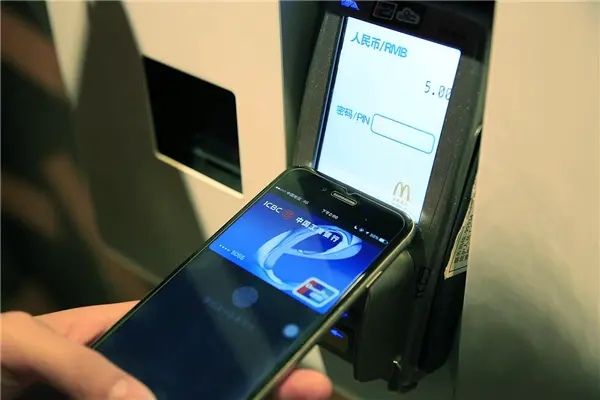The battle for the world’s biggest mobile-payment market is turning cutthroat.
SinceChinese consumers began adopting mobile paymenta few years ago, Internet giantAlibaba Group HoldingLtd.has had a lock on the huge and growing market through its Alipay system, run by an affiliate company. But now leading domestic rivalTencent HoldingsLtd.is leveraging the popularity of its WeChat social-messaging app to increase its slice, andbig foreign players includingAppleInc.andSamsung ElectronicsCo.are jumping in with their own systems.
The battle is especially intense because hundreds of millions of smartphone users and businesses haveembraced payment via phone in China,where credit-card use is limited. Last year mobile transactions more than doubled to $235 billion, pushing China ahead of the U.S., where the market grew 42% to $231 billion, according to data provider Euromonitor International.
Tencent—whose WeChat app has 762 million monthly active users—is spending heavily on discounts and distinct features, as well as making alliances to allow it to offer more on-demand services.
The aim: win over hundreds of millions of Alipay users likeWang Wei.One recent lure: cheaper chicken.
When the 23-year-old legal assistant from Xi’an stepped up to the KFC counter to order a chicken sandwich, the clerk told him that using the WeChat app’s payment option would get him a discount coupon that he could also share with friends on WeChat’s social network.
“Most of the time, I still use Alipay,” Mr. Wang said. “But WeChat Pay is also becoming convenient.”
Tencent nearly doubled its mobile-payments share last year, to 20% from 11% in 2014, while Alipay’s share fell to 68% from 82%, according to research firm iResearch. Tencent said it had nearly seven times as many monthly active users in 2015 as in 2014; it didn’t disclose the actual number. Alipay has more than 450 million active users.
Despite the growth, Tencent’s payment business isn’t profitable. Alibaba affiliate Ant Financial Services Group declined to say whether its payment business is profitable.
“Overall, we look at payments as a business that may generate more revenue, but we continue to invest in it,” Tencent PresidentMarin Lausaid on a call with analysts Wednesday. Tencent’s sales and marketing expenses were up 53% in the first quarter, in part because of higher spending for the payment service.
In their mobile-payment battle, both Alibaba and Tencenthave broader ambitions.Payment platforms enable them to collect more data on transactions, which can help them tailor financial services from wealth management to consumer lending. The two companies’ financial affiliates both offer loans and investment products such as money-market funds.
The payment business is a “very important launchpad,” Mr. Lau said.
In March Tencent began charging users a 0.1% fee to transfer money from WeChat Pay to bank accounts, passing on the bank fees for such transfers. Tencent said this hasn’t hurt user growth.
One of Tencent’s challenges is that for all its ubiquity, some WeChat users don’t see the app as a platform for commercial activities like shopping.
“WeChat to me is just a communication tool,” said Liang Quan-wei, a university student in Shenzhen who says he uses Alipay far more often than WeChat Pay.
To address this, Tencent has invested billions of dollars in startups including ride-sharing company Didi Chuxing Technology Co. and group-buying service Meituan-Dianping. Linking partners’ apps with WeChat allows users to pay for the services directly though WeChat Pay, broadening its acceptance by consumers. Over the past year, Tencent has also added the likes ofMcDonald’s,7-Eleven and Uniqlo to the list of retail outlets in China that accept WeChat Pay.
Alibaba has also been making alliancesto connect Alipay with more brick-and-mortar businesses. Last month, Alibaba and its financial affiliate Ant Financial Services Group jointlyinvested $1.25 billion in food-delivery app maker Ele.me.
Tencent payment-platform teams are studying Alipay’s operations closely, according to Tencent managers who declined to be named. The company’s Internet finance department, which includes the payment operation, has more than doubled over the past three years to about 1,000 people, according to one of the managers.
Since February, Tencent has also been trying to get more overseas stores to accept WeChat Pay. Alipay already offers a wide range of overseas payment services for Chinese travelers.
One Tencent edge is a feature that lets userssend virtual envelopes stuffed with electronic cash—the online version of Chinese Lunar New Year tradition of giving money in red envelopes called hongbao. During this year’s holidays in February, WeChat users exchanged more than 32 billion hongbao envelopes, nine times as many as last year, Tencent said. Alipay held its own holiday promotion in which users collected “lucky cards” by connecting with other users through the app’s social feature, which was added last year. Collecting all five types of card was good for a cash prize of more than $30.
“We are the underdog, but we are starting to catch up,” one of the Tencent managers said.
(THE WALL STREET JOURNAL)
 简体中文
简体中文

